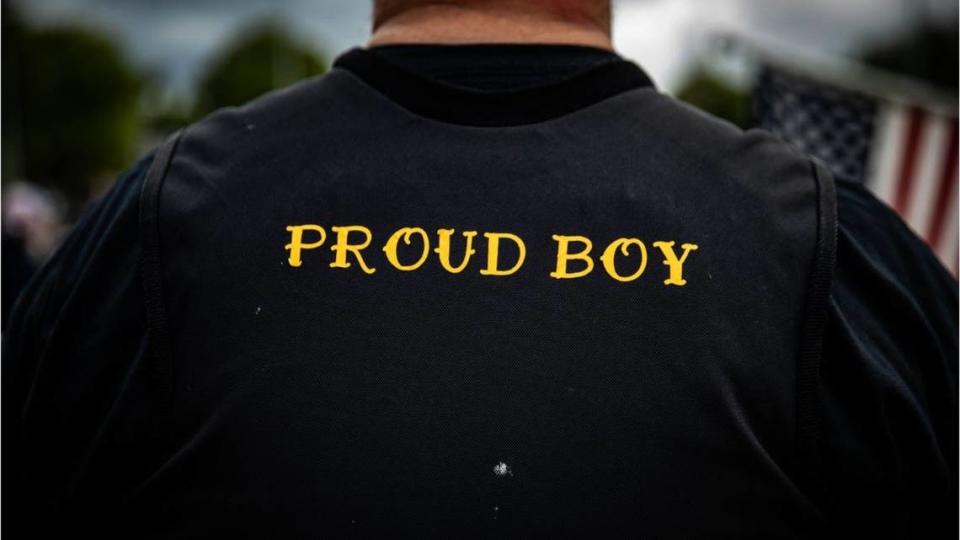Voting intimidation emails to UF students may be scam, authorities say

A string of voter intimidation emails that were purportedly sent by the Proud Boys, a self-described militia group, were reported to state and federal law enforcement officials on Tuesday morning, according to Alachua Supervisor of Elections Kim Barton.
Alachua County officials were made aware of the emails on Tuesday morning. In one of the emails, the sender told a voter to “vote for Trump on Election Day or we will come after you,” according to a copy obtained by the Miami Herald.
“Change your party affiliation to Republican to let us know you received our message and will comply,” the email said. “We will know which candidate you voted for. I would take it seriously if I were you.”
The email shows a sender with the address, info@officialproudboys.com. But officials have not pointed to any evidence that the email came from the far-right group.
“The email appears to be a scam and we will be initiating an investigation into the source of the email along with assistance from our partners on the federal level,” Alachua Sheriff’s Office officials said in a Facebook post Tuesday.
CBS News and Vice News have each reported that the source code embedded in seven emails shows the message originated from IP addresses linked to servers in Saudi Arabia, the United Arab Emirates and Estonia.
Proud Boy Chairman Henry “Enrique” Tarrio Jr. said the email was “spoofed” and he notified the FBI and Barton to tell them the group was not behind the emails.
“There is no reason for us to send an email like that. To whoever did this, I condemn these people,” Tarrio told the Herald.
Commissioner Marihelen Wheeler, a member of the Alachua County canvassing board alongside Barton and other county officials, said the emails were a “disruption” during a busy early voting day.
“It took up time and energy that we didn’t really have,” Wheeler said in a phone interview Tuesday evening.
Barton was trying to make sure ballots were processed properly while calling law enforcement officials to make sure the voter intimidation tactic was handled appropriately, Wheeler said.
“It was just a nuisance,” she said.
Proud Boys try to assimilate into Florida GOP as Trump denies knowing extremist group
Wheeler was in the room when Tarrio called Barton to tell her it had not been them.
“They called and said that it wasn’t them and we all just rolled our eyes and laughed at it,” Wheeler said.
Wheeler said the group was really concerned about voter intimidation when they first heard more than a dozen citizens had received the emails. As time went by, it became difficult to discern the source, adding that she would not be surprised if foreign governments were tied to the emails.
“It is time to find out who is doing this, and if necessary press charges to the point that other people are dissuaded from doing it,” she said. “There is no room for this kind of hanky panky and do it for fun because there are people who can really mess with us.”
Barton said her office was working with local, state and federal law enforcement officials, including the Federal Bureau of Investigation and the U.S. Department of Homeland Security to look into the emails.
The Florida Department of State’s Division of Elections has been notified, too, Barton said. Florida Department of Law Enforcement officials did not immediately respond to request for comment.
“If any individual engaged in any form of voter intimidation, our office will refer the case to state and federal law enforcement,” she said in a press release.
Under Florida law, a person who directly or indirectly uses intimidation to compel an individual to vote for any individual on the ballot commits a third-degree felony.
Tarrio insists The Proud Boys are not behind the emails, noting the group never uses mass emails to communicate with anyone.
“Nobody should be intimidated at this time,” he said. “You should be able to vote for whoever it is you want.”
A University of Florida senior, who didn’t want to give her name because of concerns about retribution, said she was sitting in a common area working on her laptop about 10:30 a.m. Tuesday at the school’s Gainesville campus when she heard her email ding.
“When I saw the subject line ‘Vote for Trump or else!’ I thought it was a joke,” said the 21-year-old journalism major. “The first thing I did was panic for a brief moment.”
She said she then took a picture on her phone and sent it to her friends to see if anyone else received it. They did not.
“Then I panicked a little more,” she said. But after searching the internet she learned she was not alone.
When asked if she was concerned about voting, the student said, “It still feels like this is just a joke.”
“I am still going to vote,” she said.
Another senior checked her UF email before class and saw a message from Proud Boys at 10:42 a.m.
“I was really confused,” said the 21-year-old. “I was like ‘Why am I receiving something from the Proud Boys?’ I would have not signed for anything like that. It was a little jarring.”
She said she opened it immediately and was concerned at first. But she said she became suspicious after reading the line, “We will know which candidate you voted for.”
“Thankfully, they messed up at the end,” she said. “I know there is no way for them to know who I actually vote for.”
She was concerned that the email could work to intimidate some voters — especially fellow students, who may be first-time voters.
“I am going to vote. That is not going to stop me,” she said. “But I think it could have an effect. When your first introduction to voting is getting something like this, it may scare you away.”

 Yahoo Finance
Yahoo Finance 